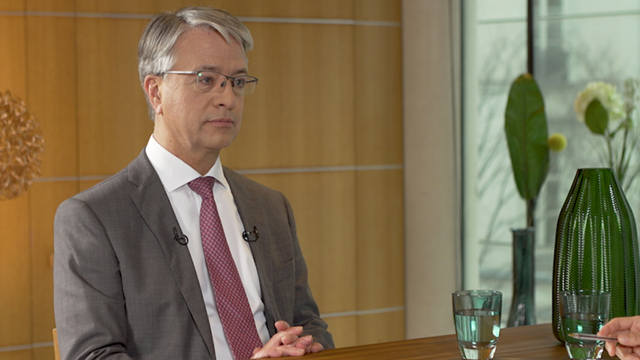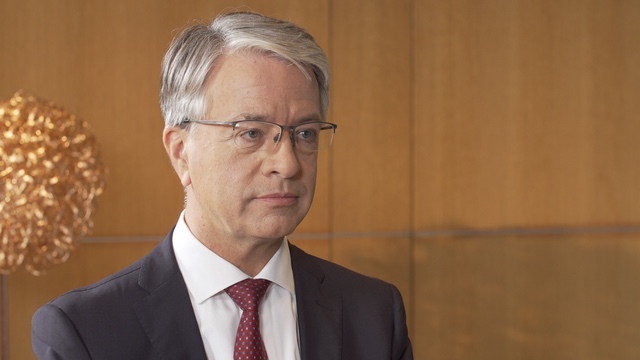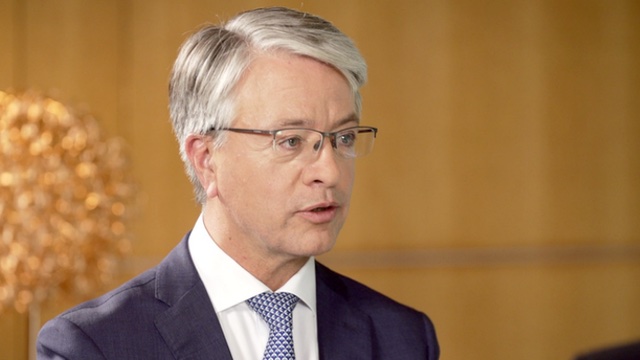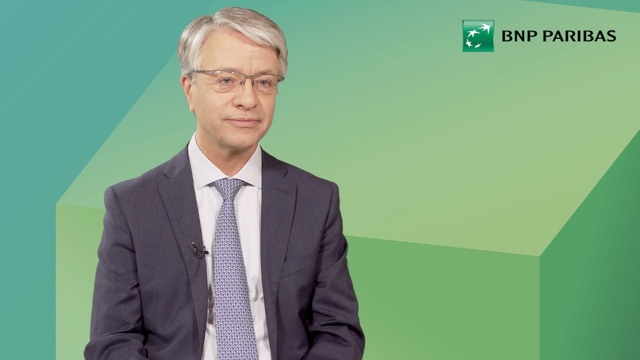EuroBusiness Media (EBM): BNP Paribas, one of Europe’s leading banks, reports 2014 first quarter results. Jean-Laurent Bonnafé welcome! You are the CEO of BNP Paribas. What are your comments on your Q1 results?
Jean-Laurent Bonnafé: BNP Paribas closed the first quarter with solid results and a net income of 1.7 billion euros. The bottom line was not affected by one-off items this quarter.
Q1 revenues of the operating divisions were only marginally lower at constant scope & exchange rates. This was the result of an increase in Investment Solutions coupled with a slight improvement in Retail Banking while CIB’s revenues held up well, benefitting from a strong performance of Equities & Advisory.
Operating expenses confirmed good cost control in conjunction with the ongoing investments related to the implementation of the development plans. In Q1 we continued to implement Simple & Efficient across the Group which generated an additional 211 million of recurrent cost savings in conjunction with 142 million of one-off transformation costs.
Cost of risk stood at 68 basis points as a ratio of customer loans, marking an increase this quarter. It included a 100 million portfolio based provision related to recent events in Eastern Europe.
On the back of its strong profit generation capacity, BNP Paribas’ Basel 3 fully loaded core Tier 1 ratio stood at 10.6%, well above the regulatory requirement. This was also the case for our leverage ratio which was confirmed at 3.7%.
In addition, our immediately available liquidity reserves stood at an ample 264 billion euros at the end of March 2014.
At the same time, BNP Paribas continued to grow its deposit base, as shown by Retail Banking deposits which increased by 5.4% at constant exchange rates compared to the previous year.
EBM: Could you comment on the main factors that weighed on your cost of risk this quarter? How are things shaping up at BNL?
Jean-Laurent Bonnafé: As I just said, the Group’ cost of risk was higher in Q1 as it was impacted by a portfolio based provision in Eastern Europe due to recent events in the area.
Excluding this provision, cost of risk increased by 11.6% at constant scope & exchange rates. It was globally stable in the main businesses and geographies with the exception of BNL in Italy whose cost of risk continued to suffer from the effects of one of the longest recessions in the country’s history. As we have already said, 2014 will remain challenging and we expect cost of risk to remain at a high level this year.
EBM: How would you qualify the overall performance of your Domestic Markets in Q1?
Jean-Laurent Bonnafé: In Q1 Domestic Markets remained quite dynamic in terms of deposit gathering, with good growth in France, Belgium and at Cortal Consors in Germany. Total deposits climbed to 293 billion, marking a 5% increase on the previous year.
Lending activity remained soft, reflecting low client demand for credit.
We continued to significantly increase assets under management in our private banking with good performances in our 3 main markets that is: France, Italy and Belgium.
Revenues progressed by 1.7% in Q1. This was driven in particular by the strong performance of off-balance sheet savings, private banking and Arval.
Effective cost control translated into an improvement of the operating efficiency with the cost/income ratio of Domestic Markets decreasing by 0.9 points to 61.7% with positive jaws effects in France, Italy and Belgium.
Gross operating income increased by 4% while pre-tax income stood at 0.9 billion euros, lower than the previous year due to the already mentioned rise in the cost of risk in Italy.
EBM: In Q1 what was the impact of foreign currency fluctuations
given your stature as an international retail bank? How did your international retail banking operations fare in such a context?
Jean-Laurent Bonnafé: International Retail Banking’s results were affected by exchange rate fluctuations in the first quarter. While this impacted revenues and costs, the net effect on pre-tax income on a Group’s scale was limited because we book revenues and costs in the same currency. In the first quarter, the impact on pre-tax income actually amounted to 28 million euros or 6 percentage points of annual variation. This was particularly due to the significant devaluation of the Turkish Lira - which lost some 22% versus the euro in one year - and the slight depreciation of the US dollar over the period.
Hence, to get a proper idea of the performance of our International Retail Banking we should look at the results at constant scope & exchange rates.
Starting with the Europe-Med division, which confirmed dynamic activity in Q1. In fact both loans and deposits increased by over 11% on the previous year with a good contribution on both fronts from our Turkish operations. Development of our cash management capabilities continued alongside that of our private banking which saw assets under management increase significantly.
Revenues were lower but this was due to the impact of regulatory changes in Algeria and Turkey which came into effect in Q3 of last year. Net of this effect, revenues progressed by 5% despite the negative impact from the Ukraine caused by the difficult context in the country.
Operating costs were 5% higher mostly on the back of the continued strengthening of TEB’s commercial set up in the course of 2013.
Pre-tax income was penalized by the portfolio based provision I mentioned before related to Eastern Europe. If we exclude this, Europe-Med’s pre-tax income was 12.6% lower in Q1.
If we now look at BancWest in the US, good volume growth was confirmed in Q1 with deposits and loans increasing at about 5% compared to the previous year. Private banking also continued to develop well, as confirmed by the further increase in assets under management.
Revenues were slightly lower if we allow for lesser capital gains on loan sales this quarter compared to Q1 2013 since the level of interest rates remained not very favourable.
Higher regulatory expenses, especially related to upcoming regulatory changes, impacted operating costs as did the ongoing strengthening of the commercial set up, partly offset by savings deriving from the branch network rationalization.
Overall, BancWest’s pre-tax income was 14.6% lower in Q1 at 156 million euros.
EBM: As the picture for consumer credit across Europe brightens, have you already seen some benefits on your Personal Finance performance this quarter?
Jean-Laurent Bonnafé: Personal Finance remained very active this quarter as it continued to develop its sources of growth. In Q1 Personal Finance signed several partnership agreements in the auto sector - such as PSA in Turkey - and in the distribution sector - such as Metro in Hungary.
Pending regulatory approval, we also agreed the acquisition of RCS in South Africa which is a point-of-sale consumer finance specialist.
This overall dynamism is reflected in the increase in loan outstandings by close to 3% on a comparable basis.
Revenues were 1.7% higher at constant scope & exchange rates, driven by a good performance in Germany, Belgium and Central Europe and with a slight increase in France. Partnerships started in various geographies last year also started to bear fruit.
Good cost control ensured that operating expenses were only slightly higher in Q1. Hence, Personal Finance showed positive jaws and an improving cost/income ratio in the quarter.
Pre-tax income reached 216 million euros marking an improvement of 4.3% at constant scope & exchange rates.
In conclusion, this quarter Personal Finance showed higher results and dynamic development of its sources of growth.
EBM: How have the different businesses of your Investment Solutions performed this quarter? Regarding your Insurance business, what opportunities do you see to further grow and expand it?
Jean-Laurent Bonnafé: Investment Solutions had a good quarter as assets under management increased by 20 billion euros to 874 billion. This was driven by two main factors. First, the performance effect which benefitted from the favourable trends of stock markets and interest rates.
Second, net inflows which totalled 8.7 billion with a positive contribution from all business lines. In more detail, Asset Management saw slightly positive net flows especially on the back of an increase in bond funds.
Wealth Management saw strong inflows particularly in the Domestic Markets and in Hong Kong.
Insurance inflows mainly came from Italy and France in Europe, and Taiwan in Asia.
At constant scope & exchange rates, Q1 revenues were up 2.7% mostly due to the strong improvement in Securities Services where transaction volumes and assets under custody increased significantly. Insurance and Wealth Management were also up while Asset Management was hampered by lower average outstandings.
Operating costs progressed due to the increasing activity in Insurance and Securities Services and the implementation of the development plans. However, this increase was lower than the revenue growth rate leading to an improvement of the cost income ratio.
Pre-tax income reached 545 million this quarter on the back of a 3% increase on the previous year.
Regarding growth opportunities in our Insurance business, we have been expanding this business for the past few years through partnerships and joint-ventures. In just over a decade we have trebled Insurance revenues from 700 million in 2003 to over 2.1 billion in 2013. Today, with a presence in 37 countries, BNP Paribas Cardif already generates close to 60% of its gross written premiums outside France.
And we are increasingly targeting fast growing markets, in particular Latin America and Asia Pacific.
Another lever for growth is the further development of partnerships as shown by the recent agreements we signed in Asia with Bank of Beijing and Saïgon Commercial Bank.
In addition, we are increasingly diversifying our product offer in particular by growing the relative weight of protection products.
As you can see, we have several ways to continue to grow our insurance business.
EBM: In your CIB franchise, Fixed Income revenues are down like most of your competitors. What’s behind this evolution in your case? How is the roll out of the new model progressing in your Corporate Banking?
Jean-Laurent Bonnafé: The operating environment for Fixed Income was not particularly favourable in the first part of the year. We saw low demand on interest rates and forex, even though the credit side performed well. Emerging markets activity was also rather subdued this quarter.
However, primary activity remained relatively strong. We actually gained market share especially with financial institutions, confirming our n° 1 position on issues in Euro and climbing one place to n° 7 for all international bonds.
Within Capital Market activities, as I said before, Equity & Advisory had a strong quarter with widespread growth driven by Asia and Europe, and high clients’ demand for structured products.
We also signed an agreement with RBS for the transfer of a portfolio of equity derivatives. It shows BNP Paribas’ ability in gaining market share in an industry that has seen several banks pull back. This deal had no impact yet on our results.
Looking at Corporate Banking, we started to reap the first benefits of the business development plans we have been implementing in Asia and in the Americas. Despite this, revenues were slightly softer at constant scope & exchange rates due to lower activity in the EMEA region with the absence of sizeable deals and a slowdown in the Energy & Commodity sector.
The beneficial effects of the new model were visible in terms of commission income which increased by over 5% and deposits which reached 73 billion euros showing a 17% increase compared to the previous year.
Pre-tax income in the quarter was impacted by a portfolio based provision for 50 million euros related to the difficult context in Eastern Europe.
In Q1 we confirmed our n° 1 spot for syndicated loans in Europe. In addition, we further consolidated our leading positions in Europe for corporate banking, cash management and trade finance.
EBM: Jean-Laurent Bonnafé, CEO of BNP Paribas, thank you very much!
Jean-Laurent Bonnafé: You’re welcome!






